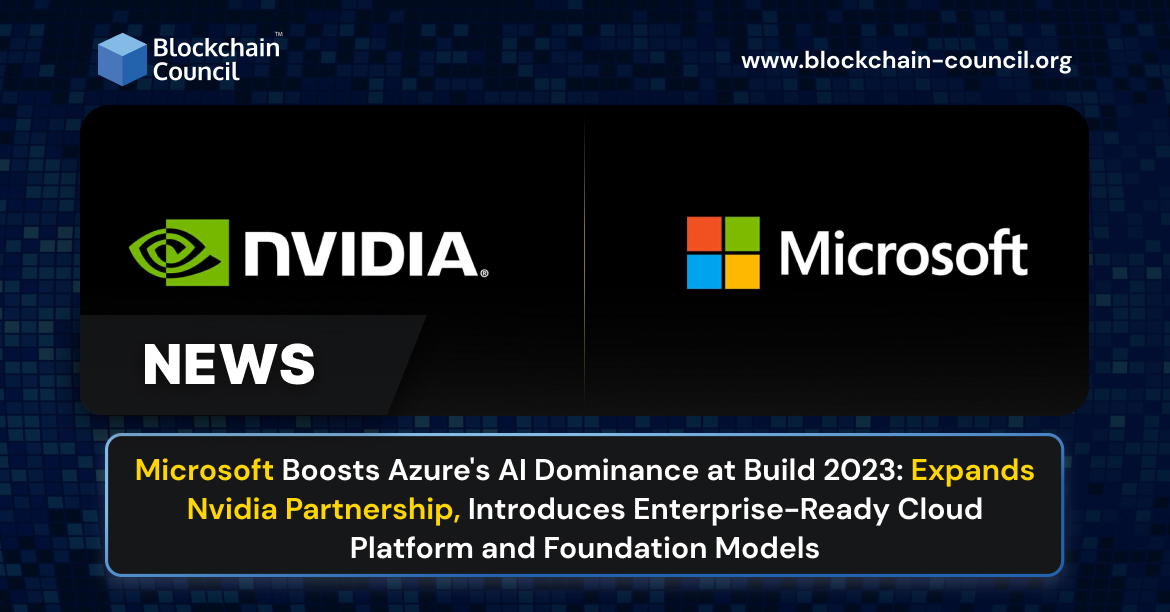
- Blockchain Council
- June 06, 2023
The world of technology is constantly evolving, and artificial intelligence (AI) is at the forefront of this transformation. Microsoft, one of the leading tech companies, has been making significant strides in AI development and integration. At the recently concluded Microsoft Build 2023 event, the company announced several groundbreaking initiatives that will further strengthen its Azure cloud platform and solidify its dominance in the AI space.
One of the most significant announcements made at Build 2023 was Microsoft’s expanded partnership with Nvidia, a renowned technology company known for its graphics processing units (GPUs) and AI expertise. This collaboration aims to integrate Nvidia’s AI Enterprise software into Microsoft’s Azure Machine Learning, creating a secure and enterprise-ready platform for AI development and deployment. By leveraging Nvidia’s powerful AI frameworks and tools, Azure customers will have access to enhanced capabilities that accelerate their AI initiatives.
Manuvir Das, the Vice President of Enterprise Computing at Nvidia, highlighted the importance of this integration, stating that enterprises are actively seeking secure and efficient tools to drive innovation in the coming wave of generative AI applications. The combination of Nvidia AI Enterprise software and Azure Machine Learning provides a straight and efficient path for enterprises to speed up their AI initiatives from development to production.
The integration of Nvidia AI Enterprise with Azure Machine Learning offers several benefits to developers and enterprises. It provides access to high-performance Nvidia accelerated computing resources, which significantly speeds up the training and inference of AI models. Additionally, Microsoft Azure Machine Learning users can scale their applications easily, from small tests to massive deployments, while ensuring data encryption, access control, and compliance with organizational policies.
Also read: Google Launches Search Generative Experience (SGE) with AI Answers Integrated into Search Results.
Nvidia AI Enterprise brings a wide range of capabilities to Azure Machine Learning, including over 100 frameworks, pre-trained models, and development tools. For example, Nvidia RAPIDS™ accelerates data science workloads, while Nvidia Metropolis facilitates vision AI model development. The Nvidia Triton Inference Server™ enables enterprises to standardize model deployment and execution, ensuring seamless integration into their existing infrastructure.
The integration of Nvidia AI Enterprise and Azure Machine Learning is currently available in a limited technical preview, giving developers the opportunity to explore and harness the power of this combined platform. Moreover, Microsoft has made Nvidia AI Enterprise available on the Azure Marketplace, expanding the options for secure and supported AI development and deployment worldwide.
In addition to the Nvidia partnership, Microsoft introduced the NVIDIA Omniverse Cloud™ platform-as-a-service on Microsoft Azure. This offering provides developers and enterprises with a comprehensive cloud environment to design, develop, deploy, and manage industrial metaverse applications at scale. The integration of Nvidia GPUs, ONNX Runtime, and the Olive toolchain enables the implementation of accelerated AI models without the need for extensive hardware knowledge.
Microsoft’s commitment to AI innovation goes beyond partnerships and integrations. During the Build event, the company unveiled new concepts, such as copilots and plugins, that aim to revolutionize the way software is built and enhance the developer experience. Copilots, powered by large language models like GPT-4, assist users with complex tasks, while plugins augment the capabilities of AI systems, enabling them to interact with external APIs and retrieve real-time information.
Also read: Microsoft Introduces AI-Powered “Microsoft 365 Copilot” to OneNote
To support the growth of the AI plugin ecosystem, Microsoft adopted an open plugin standard introduced by OpenAI for ChatGPT. This standard allows developers to build plugins that work across various Microsoft Copilot offerings, including ChatGPT, Bing, Dynamics 365 Copilot, and Microsoft 365 Copilot. Bing, in particular, expanded its support for plugins with partnerships with platforms such as Expedia, Instacart, Kayak, Klarna, Redfin, and Zillow. This integration enhances the search experience and provides up.
This integration enhances the search experience and provides users with real-time information from these popular platforms directly within the Bing search results.
Furthermore, Microsoft introduced the concept of Foundation Models, which are large pre-trained models that serve as a starting point for various AI tasks. These models, built on the foundation of GPT-3.5, offer a powerful base for developers to build upon, enabling them to create more advanced and specialized AI models with reduced time and resources. Microsoft aims to foster a community-driven approach to AI model development, encouraging researchers and developers to collaborate and build upon these foundation models to drive innovation in various domains.
To promote the adoption and collaboration around Foundation Models, Microsoft launched the OpenAI Developer License, which grants free access to GPT-3.5-based models for research and development purposes. This initiative aims to democratize access to powerful AI capabilities and accelerate AI advancements across industries.
In addition to these major announcements, Microsoft Build 2023 showcased various updates and enhancements across the Azure ecosystem. This includes advancements in Azure AI services, Azure Quantum, Azure IoT, and Azure Cognitive Services, among others. These updates provide developers and organizations with improved tools and capabilities to leverage AI and cloud technologies for their specific use cases.
Microsoft’s presence at Build 2023 demonstrated its commitment to advancing AI technologies and empowering developers and enterprises with innovative tools and platforms. The expanded partnership with Nvidia, the introduction of enterprise-ready cloud platforms, and the concept of Foundation Models all contribute to Microsoft’s goal of driving AI adoption and pushing the boundaries of what is possible with AI-powered solutions.
Also read: Microsoft and Nvidia Join Forces to Revolutionize the Metaverse



































































 Guides
Guides News
News Blockchain
Blockchain Cryptocurrency
& Digital Assets
Cryptocurrency
& Digital Assets Web3
Web3 Metaverse & NFTs
Metaverse & NFTs
